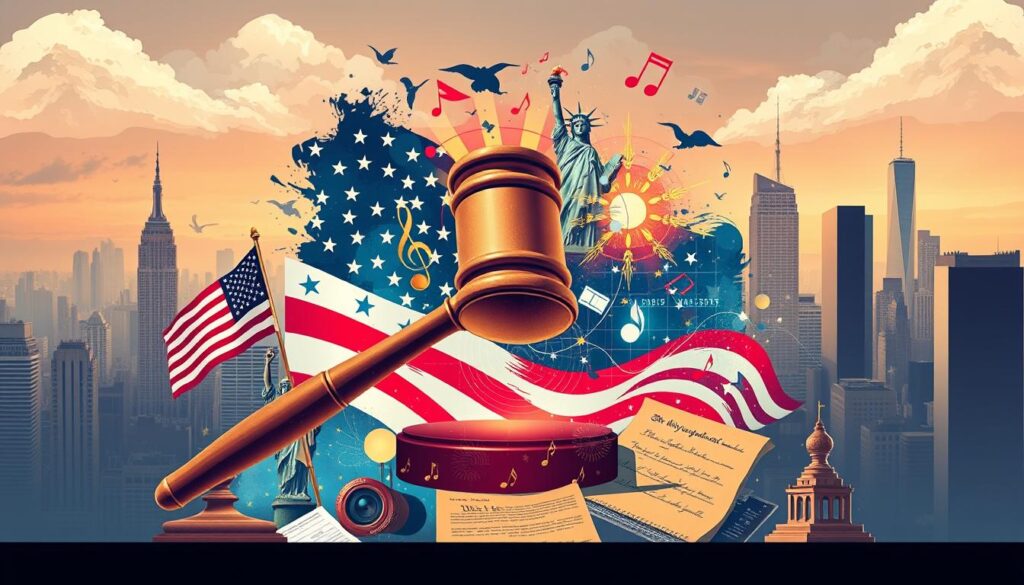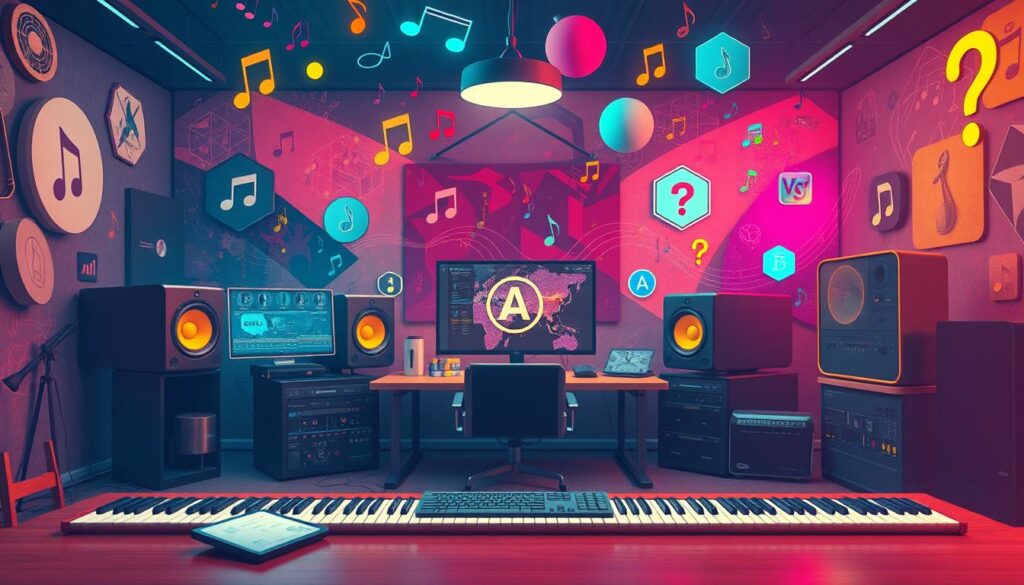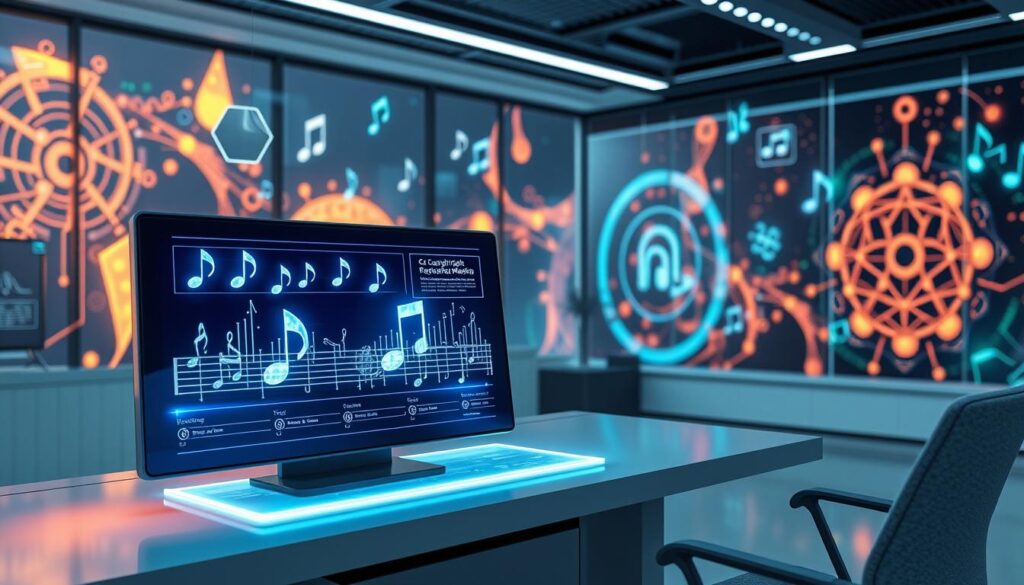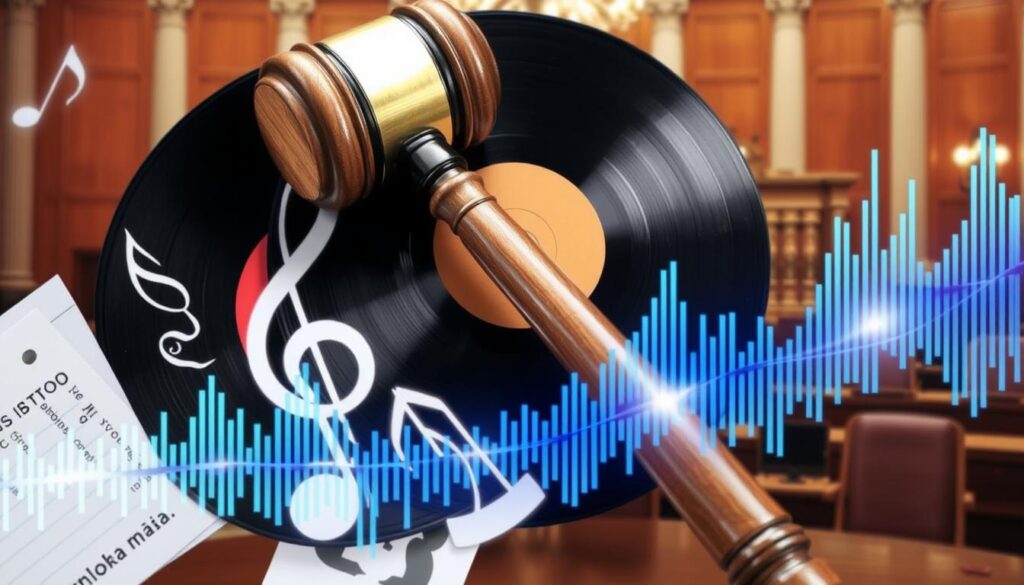“The greatest danger in times of turbulence is not the turbulence; it is to act with yesterday’s logic.” Peter Drucker’s words hit home in the AI music world. The music industry is seeing a boom in AI-generated tunes, raising big questions about legality. With AI music hitting the charts, the debate on copyright is heating up.
A lawsuit by Universal Music Group against Anthropic shows the legal battles ahead. This case is a big deal for record companies, artists, and publishers. They’re all trying to figure out how to deal with AI music1.
The U.S. Copyright Office is looking into AI music’s copyright issues. They’re advising Congress on changes as of October 20232. It’s important to understand if AI music can be considered legal. Questions like “Can AI create music?” and “What rights do artists have?” are key.
As the music industry talks more about AI, it’s crucial to get these points. This will help everyone involved in music.
Key Takeaways
- AI-generated music has garnered massive popularity, raising legal questions.
- Universal Music Group’s lawsuit signals challenges in protecting artists’ rights amid AI advancements.
- The U.S. Copyright Office is reviewing how generative AI impacts copyright law.
- AI-generated works may face scrutiny regarding authorship and originality.
- Registration of AI-created music is complex, with specific guidelines established by the Copyright Office.
- Human creativity remains essential in the process of AI music generation.
The Rise of AI Music Generation
The rise of AI in music is changing the music industry. New music production tools use AI to create songs in new ways. But, as of June 11, 2024, the U.S. Copyright Office doesn’t protect music made only by AI3. This means AI music can be in a legal gray area.
In the Netherlands, lawmakers are considering rules for AI music apps. They worry companies might use artists’ voices and songs to train AI4. This shows more people are thinking about how AI music affects artists.
Using AI tools more might make music styles blend together. This could lessen the unique touch of each artist5. Artists are now discussing the impact of these technologies. They’re also talking about who should be held accountable for copyright issues4.
The music industry is torn between setting strict AI music rules or letting artists self-regulate. It’s clear that protecting artists’ rights is crucial. Dr. Markellou says users need to watch out for copyright issues when using AI for business4. Finding a balance between AI’s creativity and human music-making is key.
Understanding Copyright Law in the U.S.

Copyright law in the U.S. is key for protecting original works. It tells us what can be copyrighted. The law gives authors special rights to their creations. But, it only protects works made by humans, not AI, as the U.S. Copyright Office has clarified.
AI songs, like “Heart on My Sleeve” by Ghostwriter977, bring up big questions about ownership. This song got over 9 million views on TikTok before being removed6.
Figuring out who owns AI-made content is tricky. There are two main areas to consider. One is about the people involved, and the other is about the AI’s output. Legal experts say there are problems with how AI is trained and what it creates6.
Universal Music Group’s lawyers have used the Digital Millennium Copyright Act to ask for this content to be taken down6.
The music world is changing fast, and copyright law needs to keep up. People are talking about if old laws can handle AI music. They say human creativity is key to owning copyrights7.
With cases like Rick Astley’s challenge, copyright law might change. These changes will likely reflect how AI works7.
Current State of AI Music Legislation
The world of AI music laws is changing fast. The U.S. is looking into new laws like the Generative AI Copyright Disclosure Act. They also have state laws, like Tennessee’s ELVIS Act, to deal with AI music issues8. The U.S. Copyright Office is key in these talks, figuring out how old laws and new AI tech fit together9.
AI companies face a big problem: finding enough data to train their models. They might use fake data made by algorithms8. Europe has made big laws to make data use clear, focusing on rights and copyright8. China has also made strict rules to protect copyrights in AI content8.
A recent meeting at the U.S. Patent and Trademark Office and the Copyright Office showed how urgent it is for new laws. They want to make sure AI doesn’t break copyright laws8. This push for laws is making AI companies think differently. Some are finding ways to avoid using data that could lead to copyright problems8.
Is AI Music Legal? Key Questions to Consider

The rise of AI music raises big AI music legal questions. Experts say ownership issues are key, like who owns music made by machines. In many places, AI music can’t get copyright, making things tricky10.
Getting copyright is key for protection, but figuring out who made AI music is hard. Today, proving who made AI music is tough because it’s often made by both humans and machines10. It’s important to know how to deal with copyright registration when using AI in your work.
Rules about AI music are starting to change. The Berne Convention in 1988 was a start. Now, we have the 2023 European AI Act and the Elvis Act to tackle AI voice misuse1112.
The music world is still divided. Some see AI as a chance, while others worry about its impact on artists. As AI gets better, solving these AI music legal questions and setting clear rules is more important than ever12.
The Role of Human Input in AI-Generated Music
The mix of human touch and AI in music is truly captivating. As AI changes the music world, creativity in AI music is key. Even though AI can make music and lyrics, like ChatGPT and Bandlab’s Songstarter, human creativity is what makes each piece special.
Importance of Human Creativity
Human creativity is vital in AI music. It’s the partnership between humans and AI that makes music better. For example, the U.S. Copyright Office sees AI copyright issues as a top priority for 202313. This shows how important human input is in keeping art protected.
Examples of AI-Assisted Music Creation
Many AI music examples show how well human and tech work together. Tools like Google’s Magenta use old music to make new songs, showing AI’s role in today’s music13. Sites like Soundful mix human ideas with AI, leading to new music that opens up more creative paths14. These examples highlight the need for artists to use tech to improve their work while dealing with changing copyright laws.
Copyright Registration for AI-Generated Works

The rise of AI music has led the U.S. Copyright Office to set clear AI music guidelines. They now handle about half a million registration applications each year. This includes more for AI-generated works15. It’s crucial for creators using AI in music to know the registration process.
U.S. Copyright Office Guidelines
The U.S. Copyright Office states that only human-created works can get copyright protection. In 2023, they denied copyright for an image made by AI16. They look for human creativity in applications. If human work is not clearly shown, the application might be rejected15.
What to Disclose When Registering AI Music
Creators must show how much human work went into AI music. Courts agree that works need human creativity to be copyrighted15. The Copyright Office is also exploring AI copyright issues. They’ve accepted a graphic novel with human text and AI images for registration15.
Cases Affecting AI Music Copyright
The rise of AI music generation has led to big legal battles over copyright. Two major cases were filed in the U.S. against Suno and Udio, huge music services. Sony Music and UMG Recordings are suing, saying these services copied their music without permission17.
These lawsuits claim the services used decades of music to train their AI. This is a big problem in the music world. Groups like the Artist Rights Alliance want to protect artists’ work and get permission before using AI17.
Universal Music Group and others are suing Suno and Udio too. They say we need clear rules for AI music18. This shows how complex copyright law is getting18.
The Recording Industry Association of America is suing AI song makers too. They say these AI tools are breaking copyright laws19. This fight shows we need to find a way to balance new tech and old copyright laws19.
Sample Clearance and AI Music

The music world is changing fast with AI technology. It’s getting harder to understand sampling laws for artists and producers. Sampling has been around since the 1940s, but it’s only recently become more common.
The Fairlight CMI in 1979 made sampling easier for many musicians20. Legal battles have shown how important it is to have the right to use samples. Cases like Biz Markie and De La Soul have set new rules for getting permission to use samples20.
Understanding Sampling Laws in the Context of AI
Now, the music industry is seeing big changes. Over 700 AI companies have talked to Sony Music Publishing about getting the right to use music21. Most of the world’s music is managed by ICMP, making it even more important to get the right permissions21.
Artists using AI music need to know the rules to avoid legal trouble. Not getting the right permissions can stop an artist’s work from being shared online. De La Soul faced big problems getting their music on streaming sites because of sample issues20.
Fair Use Considerations in AI Music
The use of fair use in AI music raises interesting legal questions. As AI music tools get better, it’s key to know the limits of copyright exemptions. The fair use doctrine lets you use copyrighted material without permission under certain conditions.
This has sparked debates about AI music fair use. AI music generators, like those from Udio and Suno, have brought up discussions on transformative use and parody. These are key parts of fair use.
How Fair Use Applies to AI-Generated Content
AI companies like Udio and Suno have used fair use to defend against copyright lawsuits from big labels like Universal Music Group (UMG)22. Their music generators have seen a lot of use, with Suno’s tool being used 12 million times since it started23. This shows how popular AI music tools are getting.
But, the music industry sees these startups as threats. They say AI music tools are hurting competition in the music world23.
The legal battle is complex. It involves looking at transformative use and market harm, which are key in fair use. Lawsuits from UMG against Udio and Suno focus on these points, especially if AI music is seen as transformative22.
There are worries that AI music could replace human creators. This could harm the rights of traditional artists22.
As we talk more about AI music, we need to think about fair use and the legal risks. The mix of technology and music creation shows we need to update copyright laws for the digital age.
Implications of Celebrity Voices in AI Music
The use of celebrity voices in AI music brings up many legal issues. The rights of publicity are key, letting famous people control how their image and voice are used. This is important for understanding the legal side of celebrity voices AI music, especially with more artists facing issues of unauthorized use.
Right of Publicity and AI Mash-Ups
Laws on this topic differ a lot, with California and New York having their own rules24. The use of AI voices has led to big legal problems, especially in cases involving famous artists. When voices are used without permission, it can lead to lawsuits for copyright infringement24.
The song “Heart On My Sleeve” got over 8.5 million views in just a weekend. This shows how fast AI mash-ups are becoming popular25.
Legislation like Tennessee’s ELVIS Act tries to protect musicians’ voices. It sets a standard in the debate over AI mash-ups legality25. Cases like Midler v. Ford Motor Co. show how important getting permission is when using unique voices for ads26.
As AI gets better, it’s more important to think about getting consent and being open about it.
As the industry mixes celebrity voices with AI, the legal issues will keep changing. Artists and producers need to be careful as they navigate these complex legal waters.
The Future of AI Music and Copyright
The future of AI music is closely tied to changing copyright laws. These laws aim to keep up with new tech. Every day, thousands of music copyright claims are filed, showing the music industry’s legal hurdles27. Big music labels like UMG, Warner Music, and Sony Music are suing AI music companies like Suno and Udio28.
AI music production is getting better, changing how we make and listen to music. Laws about AI music are still being worked on, showing a need for clear rules27. For example, Suno’s $125 million raise shows the industry’s interest in AI music, but raises questions about who owns the rights28.
AI music is being used more in things like YouTube videos, showing its growing role in art27. Tools like MatchTune’s CoverNet can spot AI-made copies of an artist’s voice, helping protect copyrights27. The music industry’s future with AI highlights the need for rules to protect creators’ rights27. Efforts like the NO FAKES Act show a push to tackle AI’s impact and safeguard artists28.
Potential Changes in Legislation
The growth of AI music has led to many talks about changes in copyright legislation. As AI becomes more common in music, lawmakers are looking at new ways to control its use. The Copyright Office made a clear policy in March about AI-generated music. This policy has led to the denial of many applications because they included AI-generated parts29.
Many people have shared their thoughts, with over 10,000 comments to the Copyright Office by October. By December, more than 600 people added their thoughts to the study on AI and copyright29. A new bill, introduced by Representative Adam Schiff, requires AI companies to reveal what copyrighted materials they use. If they don’t, they could face big fines. This bill asks for a list of copyrighted works thirty days before the AI model is released30.
There’s a big push for AI systems to be open about using copyrighted works. Lawsuits have also shown the need for new rules. For example, music publishers sued Anthropic for using song lyrics without permission30. These actions show that lawmakers are starting to understand the need for new laws for AI music to protect artists and encourage creativity.
Industry Perspectives on AI Music Legality
Recently, the music industry has been talking a lot about AI-generated music and its legality. Artists, legal experts, and record labels have shared their thoughts. They are all trying to figure out the challenges and questions about copyright and ownership rights.
The U.S. Copyright Office (USCO) has registered over 100 AI-assisted works as of early 2024. This shows how much interest there is in the mix of technology and music31. There have been over 10,000 comments from all over the world on the legality of AI music. This highlights the global concern and complexity of the issue31.
There’s a big debate about perspectives on AI copyright. Major record labels have sued platforms like Suno and Udio for copying over 2,300 songs. They’re asking for up to $150,000 per song, showing how serious the copyright infringement issue is32.
Industry experts say we need a careful and fair solution. We must protect artists’ rights and also allow for new technology. As AI gets better, we need to update our laws to fit AI-generated music. This is key to keeping creators safe and letting AI tools like AIVA help us create new music33.
Conclusion
The world of AI-generated music is always changing. It’s all about finding a balance between creativity and the law. The U.S. Copyright Office says AI music might not get copyright protection if it’s made alone without human help34.
This shows we really need human touch to make AI music legal. Legal fights, like those between Suno and Udio, show how tricky copyright laws can be35. These cases involve big music labels accusing companies of copying music without permission.
Understanding copyright is key for the music world. Laws like the Generative AI Copyright Disclosure Act try to make things clearer35. They want to make sure everyone knows how AI music is made.
These laws are important for the future of AI music. They help us figure out how to mix technology with creativity. It’s a big challenge, but it’s crucial for the music industry.
It’s important for everyone involved in music to stay up to date. This article has covered the basics of AI music and the law. We need to be careful about following the rules and keeping music creative.
FAQ
Is AI-generated music protected by copyright?
What constitutes sufficient human involvement for copyright eligibility in AI music?
Do musicians need to disclose AI tools used in their compositions when registering their work?
How are sampling laws affected by AI-generated music?
What is the fair use doctrine’s role in AI-generated music?
Are there legal implications for using celebrity voices in AI-generated music?
What recent cases have influenced AI music copyright laws?
What trends are emerging regarding the future of AI music and copyright laws?
How do industry experts view the legal landscape of AI-generated music?
Source Links
- AI-generated music is everywhere; is any of it legal?
- Song Sleuth — The Dos and Don’ts of Copyrighting AI Music in the U.S.
- AI, Music & Copyright: What’s the Story? — Dr. James Frankel
- The legal maze of AI music: Copyright challenges amid AI surge
- A Guide to Music Copyright With Generative AI | Soundful
- AI created a song mimicking the work of Drake and The Weeknd. What does that mean for copyright law? – Harvard Law School
- AI-Generated Music and Copyright | Clifford Chance
- Artists’ Rights in the Age of Generative AI | GJIA
- The Legality at Play in AI’s Music Revolution | RPJ Law
- You Ask, I Answer: AI Music Collaborations and Copyright? – Christopher S. Penn – Marketing AI Keynote Speaker
- Legal and Copyright Implications for AI-Music
- AI music isn’t going away. Here are 4 big questions about what’s next
- How Much Humanity Will AI-Generated Songs Need to Be Copyrightable? (Guest Column)
- Who Gets Credit for AI Generated Music | Soundful
- Copyright Registration Guidance: Works Containing Material Generated by Artificial Intelligence
- AI-Generated Music Copyright Debate: Who Owns the Rights?
- Record Companies Bring Landmark Cases for Responsible AI Against Suno and Udio in Boston and New York Federal Courts, Respectively – RIAA
- Legal Riffs: Music Industry Alleges AI Is Out of Tune
- AI song generators face legal scrutiny accused of copyright infringement. How it affects our musicians.
- How Sampling, Royalties, and Lawsuits Shape The AI Music Debate
- ‘There is no legal or indeed moral excuse for the commercial use of music by AI companies without the prior permission of songwriters and rightholders.’ – Music Business Worldwide
- Music Making Gen AI: A Deeper Dive into Fair Use – The Illusion of More
- AI music startups say copyright violation is just rock and roll
- Are AI Voices Legal? Navigating the Intricate World of Voice Technology | Speechify
- What You Need to Know If You’re Using AI-Generated Voices for Your Company | JD Supra
- IP Implications of AI-Generated Voices | Gecić Law
- How Will AI Impact Music Copyright Infringement?
- AI Music The Next Copyright Claims: Legal Challenges Ahead – Stewart Townsend – B2B SaaS Channel Sales Consultant
- AI and Copyright Law in 2023: Federal Government Activities
- New Federal Bill Could Require Disclosure of Songs Used in AI Training
- Artificial Intelligence Impacts on Copyright Law
- AI & The Music Industry; Copyright Infringement & Creative Overlaps – Naik Naik
- Legal Aspects of Copyright and AI in the Music Industry
- Are AI Music Generators Legal? | Soundful
- The Rise of AI in Music: Legal Challenges and Copyright Concerns







